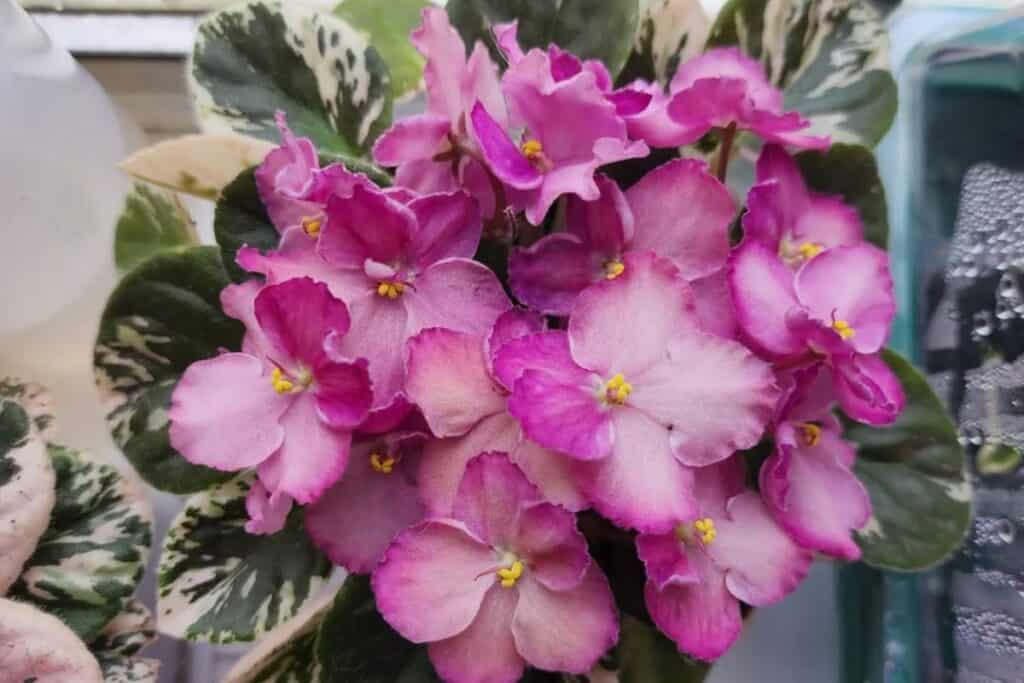Over 90% of African violet owners struggle to get their plants to bloom regularly indoors. But these beautiful houseplants aren’t as picky as people think. They just need the right mix of light, warmth, and humidity—not just water. Here’s how to help your African violets grow strong and bloom often.

☀️ Best Spot and Light for African Violets
African violets love bright, indirect sunlight—like what you get from an east-facing window. If that’s not possible, a north-facing window works too.
- Keep the plant 12–18 inches away from the window to avoid leaf burn.
- Turn the pot a little each week so it grows evenly.
- In winter, use grow lights for 14–16 hours a day, placed about 12 inches above the plant.
🪴 Soil and Potting Basics
These plants have soft roots, so they need light, airy soil. Use African violet potting mix or make your own:
- 1 part peat moss
- 1 part vermiculite
- 1 part perlite
Pick a pot that’s one-third the size of the plant’s leaf spread. Make sure it has drainage holes. Keep the crown (center of the plant) just above the soil to avoid rot.
💧 How to Water the Right Way
Watering African violets from below is best. Fill the saucer with room-temperature water and let the plant soak for 30 minutes. Then pour out any extra water.
- Check soil by pressing your finger ½ inch deep—if it’s dry, water it.
- Don’t splash water on the leaves—it can cause brown spots.
- In winter, water every 7–10 days. In summer, you might need to water twice a week.
🌡️ Temperature and Humidity Tips
African violets like it warm—between 65–75°F (18–24°C). Keep them away from cold drafts and windows during chilly weather.
They also need medium humidity (40–60%). If your home is dry:
- Use a pebble tray with water under the pot.
- Don’t mist the leaves.
- Try a small humidifier in winter.
🌿 Feeding for More Flowers

Feed your plant every 4–6 weeks with African violet fertilizer (look for 14-12-14 on the label). Mix ⅛ teaspoon into a gallon of water and use it when watering from below.
- In winter, feed every 8 weeks.
- If you see crusty soil or burnt leaf tips, flush with plain water and feed less often.
✂️ Pruning and Grooming Tips
To keep your plant healthy:
- Remove dead flowers at the base.
- Cut off yellow or damaged leaves with clean scissors.
- Brush off dust gently once a week.
- Remove small plantlets (called suckers) growing between leaves.
- Keep leaves in a flat, round shape so light reaches the center.
🌱 How to Propagate with Leaf Cuttings
Want more violets? Try leaf cuttings:
- Pick a healthy leaf with a 1–2 inch stem.
- Cut the stem at a 45° angle.
- Stick it into moist soil at a slight angle.
- Cover with clear plastic to keep humidity in.
- Place in bright, indirect light.
In 6–8 weeks, baby plants will grow near the leaf. When they’re about 2 inches tall, move them to their own pots.
🐛 Pests and Disease Prevention
Watch out for bugs like mites, mealybugs, and thrips. Check leaves weekly for:
- Spots
- Webbing
- Cotton-like clusters
If you see pests, dab them with a cotton swab dipped in 70% rubbing alcohol. To prevent problems:
- Keep air moving around the plant.
- Don’t overwater.
- Always water from below to keep leaves dry.
Remove any sick leaves right away.
🔄 Repotting and Root Care
When your violet gets 4–6 inches wide, it’s time to repot. Use a pot that’s one-third the size of the leaf spread (usually 3–4 inches wide).
- Take the plant out gently.
- Trim dead or mushy roots with clean scissors.
- Use fresh African violet soil.
- Keep the crown just above the soil.
Wait 2–3 days before watering to let roots heal. Repot once a year or when roots peek out of the drainage holes.
🌼 How to Keep African Violets Blooming All Year
To get flowers year-round:
- Keep daytime temps between 65–75°F and nighttime temps about 5°F cooler.
- Give them 12–14 hours of bright, indirect light daily.
- Feed every 2 weeks during active growth.
- Remove dead blooms and yellow leaves.
- Rotate pots weekly.
- Keep humidity around 50–60%.
In winter, cut fertilizer in half but keep watering and lighting steady.
